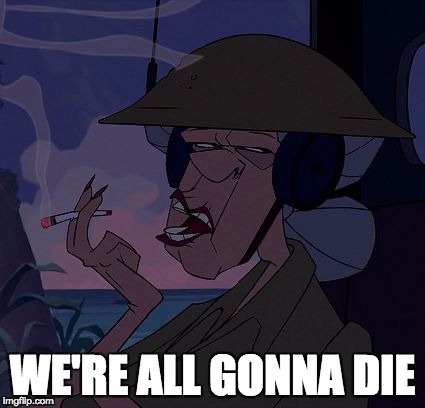Edit: We survived an ice age and we’re very highly adaptable. Plus, we will hold on to some percentage of technical knowledge that will help us adapt faster.
Bit heavy for the shower.

Let the shower wash away your tears…
I want a refund on this “no tears” baby shampoo. Didn’t do a damn thing for my depression.
That would belong on Twitter, if it was 10 years ago and not full of nazis
I think we do Mastodon now
It’s where I go to cry when it’s not raining. :(
It just hit me in a sobering sorta way.
Its the nazi version of the shower
deleted by creator
“The planet will be fine. We’re fucked.”
— St. Carlin
St. Carlin
100% . I love to see it!
Him and Buddy Christ
No species lasts forever—and the faster their environment changes, the sooner their expiration date.
When faced with a changing environment, a species has 3 choices: Adapt, Migrate, or Die.
Humans have apparently decided to vault past the first two and just yank that third lever.
I mean, why do you say that? I don’t know if any other species that lives in a greater variety of environments. There are humans living on every continent, including Antarctica. There are humans living with support in space and under the sea.
We have migrated, to everywhere. And we can adapt, to almost anything.
And to clarify, I don’t think we’ll all survive, but I highly doubt we’d all die.
Those other species weren’t the authors of the global ecosystem’s demise, even with an understanding of the situation and opportunity to change the course of events
Not really a fair comparison, is what I’m saying.
Depends on what you define as “lasts forever”. We are direct descendants of some kind of a rodent. Yeah, our species has changed “kind of much” since those days, but I wouldn’t worry about that kind of “expiration”. We are some rodents’ grand-grand-grand-…-grandchildren, and I think the rodent would be very much okay with us not looking very squirrellike, if they somehow was to find out they are our ancestor. They’d love us all the same :)
But of course, in our case, it won’t be that evolution changes us into something else. It’s rather, we will just vault 92’ify ourselves.
Some species are contesting that statement very strongly. Take the horseshoecrab, or the tardigrate or even the cockroach. Humans are known for their fast adaptability, so I’d bet my money on us joining that list.
Take the horseshoecrab, or the tardigrate or even the cockroach.
None of those are species—they’re a family, a phylum, and a (partial) order, respectively. While those clades have been relatively stable morphologically, species within each clade still come and go.
I’m sorry for the confusion, I was using the old housewives definition of species.
No other species are quite like humans though
Meh, we wouldn’t be the first species to be so successful that we kill ourselves off.
My bet for climate change is a massive migrational crisis and wars over resources.
Humankind won’t disappear, not even civilization. But life would probably be shit, and many many people will die.
I think a lot will depend on whether nuclear wars break out but yeah, even in the worst case scenarios I don’t see civilization dissappearing entirely. And honestly it all kinda makes sense to me. Nature has to regulate itself somehow. If one species becomes too dominant things get tipped out of balance. If you have an infection because an organism that is usually present in small numbers on your body has turned predatory and is growing beyond sustainable levels you develop a fever until things are back to normal. It’s the alternative to dying. (Matrix Elrond had it right)
Life isn’t shit now? Life wasn’t shit in the “good times”?
It may as well still get a bigger shit
Climate change is an ongoing process that takes decades to centuries. That’s very fast as far as evolution and natural climactic shifts are concerned, but on a human scale long term. Given that it’s not stopping within the lifespan of one person, and contributes to virtually every health problem in subtle ways, it’d seem a bit difficult to say if a given person has “survived it” or not, even if they live to an old age.
I’m not sure exactly what you mean regarding health and lifespan, but I think looking forward from 2025, things are quickly going to go off the rails. We’ve already been seeing severe problems resulting from climate change for years now, and I think that it’s going to rapidly get worse within the next 5-10 years. I’m not talking about sea level rise (except in very vulnerable places that are already partially underwater, like Florida), but about intensifying weather disasters, droughts, and shocks to the global food supply. As a result of this, I think we will see more and more unrest as well as authoritarianism used to deal with that unrest. How quickly all this is going to decimate the population is anyone’s guess.
I’m so glad I don’t have any kids. That failure was a blessing in disguise
To borrow a phrase from my profession, my not having children isn’t a bug, it’s a feature!
‘Tis my profession as well. My life is all testing on Prod.
looking forward from 2025, things are quickly going to go off the rails.
Going to? Going to? Have you not… /gestures vaguely
I hear you. I meant that more as in even more off the rails, like completely ejected off the rails.
I disagree.
I dont think its particularly likely there will be famines in the next 5 years or so on a scale that can’t be countered by aid.
Sure, economies might start to feel some very serious consequences, shit might start to get very real, I just dont think we’re quite at the point where people start dying.
I have mixed feelings about it. I think it’s perhaps 50/50 on whether things really go crazy within 5-10 years. It’s definitely more than 0% chance, especially considering that people have already been dying due to climate change for quite a while now (extreme weather events, drought, and related conflicts).
I guess it’s subjective.
Sure, climate change is starting to have an impact and more people might die due to malnutrition which is related.
My predictions within 5 years are something like :
- intensifying weather events like floods, storms, cyclones / hurricanes, to a point where insurance becomes a real unavoidable problem, putting trillions of dollars of real estate at risk.
- intensifying weather events like droughts where some traditionally viable agricultural areas no longer are, maybe a 10% reduction of arable land in any given region.
- localised famine events generating a few hundred thousand climate change refugees per year.
- increasing commercial interest in arable land in regions less likely to be impacted, farm values doubling in some areas
- increasing political interest in arable land in these same regions, with escalating political tension
I think societal collapse is still a decade away at least. However, the poor and impoverished are certainly going to start to feel the burn.
On the one hand I have a left leaning progressive mind set and have with young children - I’m heavily motivated to try to change our trajectory. On the other hand I’m 43 years old and I don’t remember a period where people weren’t predicting societal collapse in 5 years.
Climate change is bad. Mass extinctions, severe weather events, and famine, are all a certainty in the coming years. However, this needs to be balanced by technological advancements that are going to mitigate the effects. Just as an example, we can produce more food from less land than ever in history.
I pretty much agree with most of your assessment. Thank you for mentioning insurance and real estate, as that will particularly impact countries like the US, where the two have been in a feedback loop, greatly inflating home prices.
I just worry that any technological advances will only be used to either directly help people at the top or to make them richer in the process of helping those below. That has been increasingly the trend over the decades.
Yeah, you’re right in that wealthy people are heavily motivated to capture the value provided by new technologies.
However, I don’t think that’s always the case.
Roof top solar is one example. Really high rates of adoption here in Australia. The cost of the equipment has reduced dramatically and it’s a bit silly not to install at this point. It’s good for the planet and it reduces costs for individuals and families of all kinds.
Food production is another one. Yes a lot of farms are owned by large corporations, but a lot of farms are also family operations. If they make more food they make more money and secondary industries can charge farmers more money. In my area this agricultural production is the primary industry and although there might be $100k people in my city almost all employment is in supporting industries, whether that’s maintaining equipment, transporting goods, financial services, et cetera. While there’s always some concentration of wealth it doesn’t seam particularly problematic for the moment.
I don’t really know anything about this but it’s possible that in the future you’ll be able to make synthetic meats at home in a bioreactor.
I guess I’m just saying that while I agree the implications of climate change are bleak, emerging technologies might mitigate the impact on human-kind to some extent.
I get what you mean. You seem to have an optimistic view that technology will help us out of this mess eventually (or at least soften its impact). I guess in some ways I’m a pessimist, but I can respect your view and accept that your scenario is also a possible outcome. I happen to think it’s less likely than what the outcome I imagine, but it is possible. My uncle has always had a similar view as yours.
Democracy and capitalism won’t survive. 100 years from now we will all be north Korea. 1000 years from now we will all live in medieval feudalism.
this but unironically. democracy can only function in a society with good education, otherwise you end up with populists.
and education gets to the people because it pays off for the people economically. you give 12 years of your lifetime, you receive a well-paying job afterwards. if economic growth slows down, people won’t be engineers anymore and people will receive less education, thus weakening democracy.
Worse than medieval feudalism. Lords were expected to look after their vassals.
Plus, we will hold on to some percentage of technical knowledge that will help us adapt faster.
You’re running off the assumption that the survivors know useful information and that theyre also able to utilize that useful information plus be able to source needed materials since they wont have travel
Example: I know I need an antibiotic for my infection but I dont know how to create that antibiotic or how to guide someone on how to make it. If I did know id also have to get lucky that the region I live in has all the materials needed to make it. We source all around the world for our stuff.
Likely humanity will survive but probably wont advance as fast as you think.
The available worlds looked pretty grim. They had little to offer him because he had little to offer them. He had been extremely chastened to realize that although he originally came from a world which had cars and computers and ballet and Armagnac, he didn’t, by himself, know how any of it worked. He couldn’t do it. Left to his own devices he couldn’t build a toaster. He could just about make a sandwich and that was it.
-Douglas Adams, The Hitchhiker’s Guide to the Galaxy
Arthur Dent realizes that he, as an individual, is pretty useless for improving a society, but he can make a damn fine sammie.
Thanks for the TED talk (really)
That was a delightful video; thanks for sharing
I’m pretty proud of myself as i believe i could at least build a water turbine to produce electricity and light bulbs, at least i know the building plans for them, but i lack the mechanical skills to actually weld together things. but a goldsmith could weld them for me.
You’re running off the assumption that the survivors know useful information and that theyre also able to utilize that useful information plus be able to source needed materials since they wont have travel
I think we’re assuming books will continue to exist.
I think one of the real marvels of civilization is the redundancy of information. For every college course you’ve taken there’s a text book, and there may have been dozens of physical copies of that book used in your class, but also for many other classes at other schools that taught that same subject. There may have been 10,000 copies of that book in circulation across the globe, in many different countries.
It’s not impossible to lose information forever, but we’ve put in some really strong defenses against that really happening. There are a lot of libraries in coastal areas which could flood, or big cities that could burn after wars or riots. But there are also plenty of libraries in small towns, and at high elevations. Correct me if I’m wrong, but I believe Aspen has a public library for instance, and so do some of the small towns nearby that you don’t know the name of.
Just for clarification, I don’t think it’ll be fast. It will just be faster than without it.
Also, I think we’ll hang on to a lot because the survivor base will likely be made up of people from all walks of life. STEM Professionals, teachers, carpenters, you name it. And as long as we learned our lesson about religion, we’ll pass that knowledge on.
And stem professionals are also violence professionals (i.e. military and cops)? STEM tends to be very specific in their knowledge base these days. Yeah, they know how to make solar panels, but do they know where to get those materials, how to mine them? Even 80 years ago, it took several teams of hundreds of scientists to figure out nuclear energy. Lose half that team of specified individuals working together and you just have an idea. And those smart individuals gained their knowledge from smart individuals before them, and same for those individuals.
Look at Greek fire or the pyramids for examples of lost technology that 2000 years later, we still can’t figure out. Losing a scientist here or there is generally not that big of a deal, but when you can’t control how many or who goes, you lose control of the knowledge.
Likely progression is simply that food gets expensive, and is grown indoors. Technology doesn’t need to fall, though when slaves are not needed, soylent green is a “utilitarian” use for them under rules based world order. Food capacity and population that can afford to buy it will match. Fewer people does mean fewer iphones, and more expensive at lower scale.
Global warming, even at 5C, is more about increased misery and oppression, rather than mass deaths over a decade. Wikipedia will survive. The AI tech giants chatbots will explain why you need to die or be miserable until you die.
Humanity will likely survive climate change.
I like your optimism, but I don’t share it. We honestly don’t know, one way or the other. What we do know is that human extinction in on the table and growing in probability. When I look at human actions as our cumulative knowlegde of these risks grew, well, I’m not exactly confident our species will make it.
When we experience and maybe survive the next mass extinction, its going to be vastly more difficult to reindustrialize / redigitalize even if knowledge persists because we’ve already extracted the most easily accessible materials from the earth and extracting resources is becoming increasingly difficult.
If you know how to build a battery but you cant build the machines to get the lithium, you just cant build a battery. But I suppose over time we’d find better ways to recycle.
Climate change is just the tip of the big white iceberg
Yep. It doesn’t count any of the other huge problems we’re creating.
- Our farming techniques deplete the land and turn it to desert
- Over-fishing/hunting have led multiple animal populations on the brink of collapse. Even a small change could end it.
- We’re very close to depleting aquifers all over the globe. Once those are gone we don’t have anything to drink or to water our crops.
- We’re poisoning the skies and waterways with toxic chemicals, plastics, and forever chemicals.
- We’re breeding antibiotic resistant germs and modern travel allows viruses to spread worldwide in hours/days
We’re rushing towards our destruction in multiple ways. Any of those alone would result in massive deaths. And as resources get tighter, disputes and wars will break out over what’s left.
All of these together will nearly certainly lead to our destruction. And this is going to start hitting hard within 5-10 years.
I said the same thing 5 years ago and guess what? It’s already hitting hard. Look at America right now, just black bagging people off the street.
The saddest part is that we have the technology and means to fix any and all of these, just not the desire.
This all sounds amazing to me! Being a Misanthropic Anti-Natalist, I literally crave the idea of Humanity going extinct… I want us all dead yesterday! Please hurry the fuck up Climate Change! Fucking Pathetic Humans.
Sounds good. Why don’t you lead the way?
Be the change you wish to see in the world.
Just the tip?
If, in some cataclysm, all of scientific knowledge were to be destroyed, and only one sentence passed on to the next generation of creatures, what statement would contain the most information in the fewest words? I believe it is the atomic hypothesis that all things are made of atoms — little particles that move around in perpetual motion, attracting each other when they are a little distance apart, but repelling upon being squeezed into one another. In that one sentence, you will see, there is an enormous amount of information about the world, if just a little imagination and thinking are applied.
Richard Feynman
So, if, during the apocalypse, you have access to a means of passing on a message to the poor bastards who have to live in the New World, it should be this:
“Everything is made of atoms”
Atomism existed for millenia before we investigated this possibilty to such a degree that we were able leverage that concept to change the world. Its goes back to the 8th century BCE in India and the 5th century BCE in Greece. In both cases, people engaged in it imaginatively and thinking was applied. But its reach was small and only effected a small group who weren’t able to make a large societal impact.
Even in the 17th century, when there was a revival of interest in epicurean atomism, it was actively competing with corpulism. Hell, Mendelev, creator of the periodic table, didn’t believe in atoms. That’s sort of crazy to me!
Dalton, whose atomic weight was leveraged by Mendeleev and the rest rejected, posited what later became the basis of modern atomic theory. Einstein further developed this with Brownian motion describing how atoms effected the seemingly random movements of pollen. Perrin later verifies this experimentally in 1908.
So more than just the idea, it’s the culture of inquiry, debate, skepticism, investigation, and, eventually, experimentation that is important. Not just the idea. I guess, if I were to preserve anything, it would be that culture. No sentence can do that. But people’s radiance can.
* Disclaimer: this is a quick gloss of a long timeframe. A lot of details were omitted.
nah, the idea that everything is made from atoms is not very useful for most practical applications. you can even build fully-functional wind turbines, lightning bulbs and probably even telegraph networks without ever understanding anything about atoms.
Fuck Ted Faro.
Periods mfer! Can you use one‽
Plus, we will hold on to some percentage of technical knowledge that will help us adapt faster.
FYI, http://collapseos.org/ is planning for this eventuality.
Sent from my TI-84+
I don’t care if I don’t survive but I’m taking a couple of polluters with me lmao
The majority of humans won’t survive the next 100 years, because almost nobody lives to be 100.
Do you mean that the majority of people currently alive will die due to climate change?
Do you mean that humanity’s population will drop by over 50% and will not recover?
Do you mean that in the future, the majority of deaths will be due to climate change, even in 200 years from now when the new (much hotter) equilibrium will be all anyone has ever known?I think there will be a large decline in population numbers, but it should be through low birth rates and not through wars/famines. also, it will take probably a century or longer, and not happen within a few years.
we’re facing extreme economic pressure in the next 5 years to successfully implement economic reforms (tax the rich, universal basic income) to be able to survive. but, as many people have pointed out already, UBI is ultimately only a bandaid solution, because it relies on political goodwill from activists fighting for the good cause, and that makes it questionable whether it can stay implemented un-interruptedly for very long times. so, population decline would make the society more resilient because people could demand higher wages, because there’s lower supply of human labor, and that would be a long-term solution.
But would that really constitute “the vast majority of humans won’t [survive]?”
I don’t necessarily disagree, but I don’t understand what OP means by that claim.
Misleading headline. I would wager that 100% of humans alive today will not survive, if we don’t act quickly to resolve senescence.
















